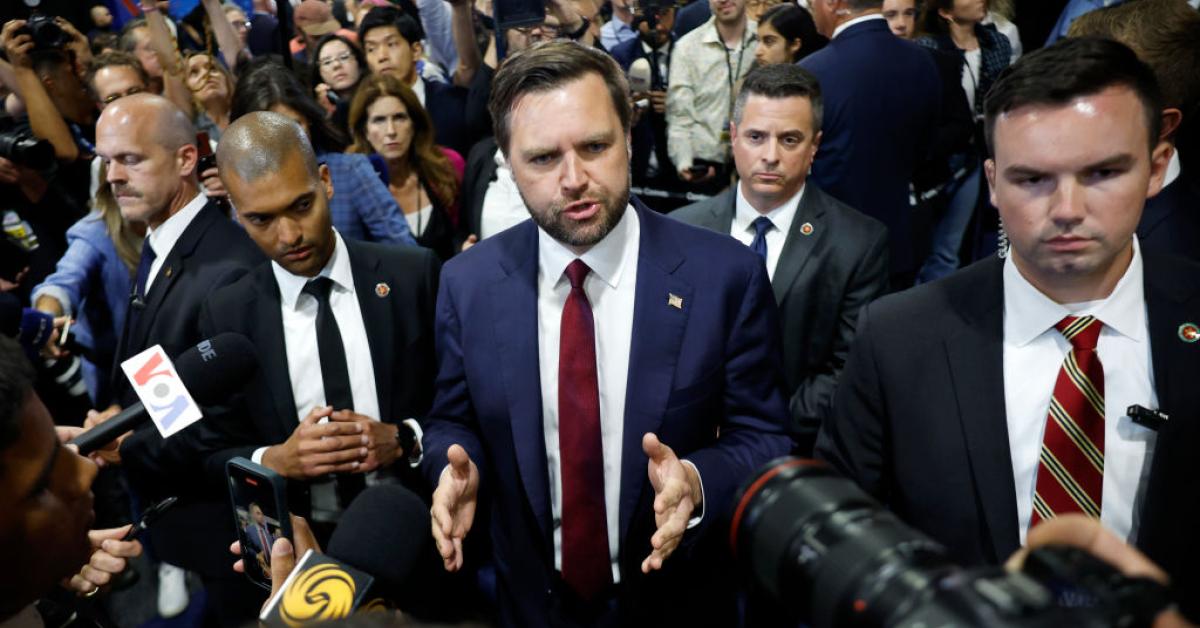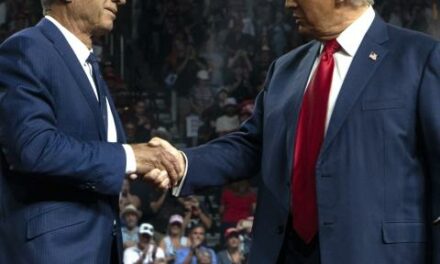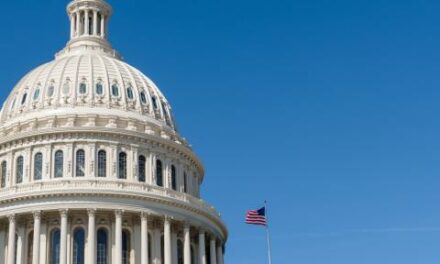We support our Publishers and Content Creators. You can view this story on their website by CLICKING HERE.

Amid mounting scrutiny of the national media’s handling of the presidential election, the huge gap between the pet interests of the pundit class and the concerns of everyday voters was on full display when former President Donald Trump and running mate JD Vance fielded questions from both groups during campaign events on Tuesday.
Vance held events in Sparta, Mich., and Eau Claire, Wis., during which he took questions from local and national media. Trump, meanwhile, held a town hall event with Gov. Sarah Huckabee Sanders, R-Ark., and answered questions from the audience.
A recent report from the Pew Research Center outlined the top issues for voters in the 2024 election. The economy ranked first, with 81% of registered voters deeming it “very important to their vote.” Health care ranked second with 65%, followed by Supreme Court appointments (63%), foreign policy (62%), violent crime (61%), immigration (61%), gun policy (56%), abortion (51%), racial and ethnic inequality (37%), and climate change (37%).
The Ohio senator took 11 questions at the Eau Claire event, four of which came from local reporters while the remaining seven came from legacy media outlets. Of those seven, four involved Springfield, Ohio, and rumors of Haitian migrants eating pets. Another involved same-sex marriage, while one addressed IVF and one addressed a national abortion ban.
The local reporters, by contrast, largely asked about policy issues, some of which were specific to the area. The contrast between local and national reporter questions was also evident at the Sparta event, albeit to a lesser extent.
Trump, for his part, fielded questions from non-reporters, including a United Auto Workers (UAW) member, a mother of three, and a local contractor, all of which directly addressed policy proposals.
The evident disconnect between national press interests and those of average voters raises questions about the ability, or desire, of the legacy media to present relevant information to audiences.
Here’s a look at what was asked:
Audience questions from Trump’s town hall
Every question Trump received from the audience at his event in Flint addressed economic issues, the top concern of voters identified in the Pew survey.
- “Isaiah,” a “third generation UAW worker”:
“My question to you, sir is, what do you see as the major threats to the future of Michigan manufacturing, autoworking jobs, and what will you do to eliminate those threats?”
- “Barbara,” a “mom of three… retired nurse”:
“So I know the cost that goes into raising children and running a household, people just can’t survive,” she said. “Now, how are you going to bring down the cost of food and groceries?”
- “Willie,” a “local contractor”:
“I’m kind of concerned about crucial [sic] Kamala’s tax increase,” he said. “Can you outline for the people what you plan on doing about taxes?”
The national press to Vance at Eau Claire
The seven questions Vance fielded from national media included several backhanded reprimands and even loaded questions, and focused largely on the Springfield migrant reports. Though connected to immigration, none of those questions addressed policy with Vance and several instead featured criticisms of his presentation of the issue. Other questions addressed peripheral issues or lower-ranked topics, such as IVF and same-sex marriage.
Note that questions have been arranged in order of topic.
- Katrina Kaufman, CBS News:
“So a woman who was behind an early Facebook post about the Haitian migrants in Springfield has now apologized for spreading false rumors,” she said. “You say that you have a responsibility to share what your constituents tell you, but don’t you also have a responsibility to fact check them first?”
- Reporter identity unclear:
“[D]o you plan to visit Springfield at any time soon? And Governor DeWine said at a press conference today that you guys haven’t spoken since the events in Springfield have played out,” the reporter said. “Do you plan to reach out to him?”
- “Corey,” Daily Mail:
“Vice President Harris said again today that the quote, ‘hateful rhetoric over migrants eating pets is what has caused the bomb threats in Springfield.’ Can you just respond to her latest please on this?”
- “Mike,” New York Times
“The question is about Springfield, not about the situation, but the style, which I think is something new that we’re seeing on the campaign trail,” the reporter said. “You’ve said, regardless of what the exact, precise facts are here, it’s worth it to make the larger point of a town overrun by immigration … That’s the point, willingness to shine a light on issues you see as important and I’m wondering if you can describe, if you know where your line is on that? Something you know at what point are, what’s something you’re willing not to say in order to make a point that is important to you?
The question from the NYT saw Vance interject to dispute the reporter’s premise that he did not concern himself with the facts. He ultimately responded by quipping that “What I wouldn’t say is that the New York Times is a respectable paper.”
- “Veronica,” CNN:
“How can voters trust lawmakers’ sincerity to protect IVF if both parties keep blocking every proposal from moving forward?”
- Taylor Popielarz, Spectrum News:
“Last night, you spoke at the Faith and Freedom Coalition dinner in Georgia,” Popielarz asked. “The coalition says on its website that it, quote, supports public policies that strengthen traditional marriage. Voters are learning about you as a vice presidential nominee. They’ll learn that you were baptized as Catholic in 2019 and that you speak at events like this. Can you clarify where you stand on same-sex marriage?”
- Jake Traylor, NBC News:
“Given your remarks on Sunday that you don’t speak on behalf of former President Trump before you’ve spoken to him about an issue, I know you said the likelihood of a federal abortion ban coming to a president’s desk is very unlikely, but given the topicality of the issue of abortion, don’t you think that’s something running mates should have discussed before?”
The local press asked pertinent questions
Vance also took four questions from local news outlets at Eau Claire. Their questions presented a marked contrast with those of the national press. One asked Vance to react to the failure of a bill in the Senate, another addressed local concerns, while the remaining two addressed health care and child care. Note that Vance took questions from local reporters before national reporters.
- Reporter, outlet unclear:
“Can you talk to us about why you are prioritizing coming to western Wisconsin. This is your second time here. Why is this area so important to your campaign?”
- Allyson Fergot, WKBT News 8:
“So, access to child care is an ongoing issue in western Wisconsin, and you’ve previously said grandparents and other family members should help out more,” she began. “Unfortunately, that is not a reality for every Wisconsin family. So what policies do you and former President Trump support that would make childcare more accessible for our hardworking Wisconsin families?”
- James Kelly, Civic Media:
“Right now, in the Chippewa Valley, we’re facing a healthcare crisis with the abrupt closure of two hospitals earlier this year, as well as a number of clinics,” he said. “Glad you mentioned providing actual concrete answers to questions. What concrete plans would your administration have to protect rural health care access?”
- “Kim”, WEAU:
“The Senate today blocked an IVF bill. Do you have any comments you want to share about that?” she asked. “Especially considering last time Trump was in western Wisconsin, he shared his support for that.”
In Sparta, meanwhile, the local press was particularly focused on the implications of policy proposals for their area and saw them press Vance for details.
- Beth LeBlanc, Detroit News:
“I know you’ve mentioned that we’re too reliant on Chinese made electric vehicles. What do you think about bringing some of that manufacturing back to Michigan, some of some of the incentives recently for Gotion, or for the Ford Marshall Project?” she asked. “They’re saying they’re trying to accomplish that, I guess. How do you address that? Respond to it?”
- Riley Connell, WILX News 10:
“You spoke a few moments ago about some of those day one tax cut plans for the American people,” he said. “Can you talk a little bit more about what that plan might look like, what it might look like for folks in Michigan, some of those plans to cut costs for folks maybe right here in the audience?”
- Autumn Pitcher, News Channel 3:
“With the former assassination attempt on former President Trump, are you and Trump considering having campaign events inside moving forward?” she asked. “And then also, was this event inside today because of that?”

 Conservative
Conservative  Search
Search Trending
Trending Current News
Current News 





